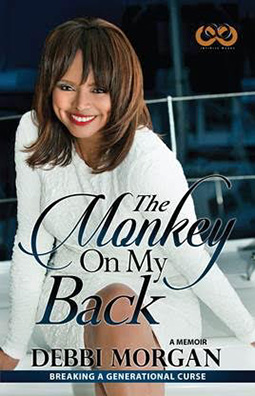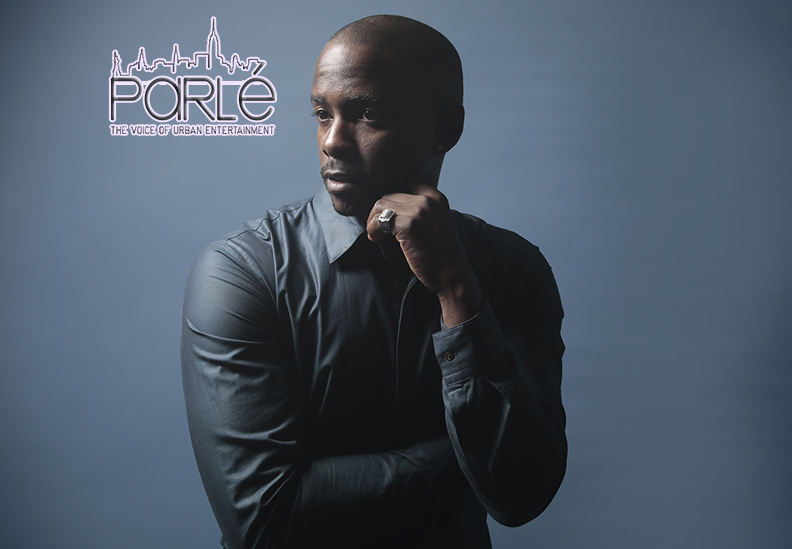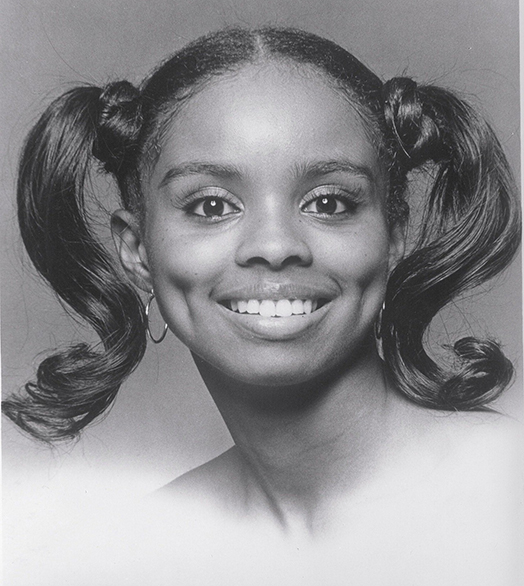Actress turned author, Debbi Morgan was born in in Dunn, North Carolina. You may recognize her from the film Eve’s Bayou, The Roots: The Next Generation or most probably from her most popular role as the Emmy nominated, Angie Hubbard from All My Children. There’s more to add to her list of accomplishments, but in this particular interview we learned a lot from our discussion about her newly released book, Monkey On My Back. The book, a memoir, is definitely a page turner from beginning to end. She tells how an ugly pattern of abuse developed early on in her family. That abuse turned into “fear, insecurity, self-doubt and emotional trauma, which passed down from one generation to the next.” Enjoy this interview as she opens up about the inspirational journey of penning this book and taking steps to break the cycle.
Parlé Mag: Miss Debbi Morgan, let me just say, it is such a pleasure to speak with you today. How are you?
Debbi Morgan: I’m doing good!
Parlé: Let’s get right into the book, The Monkey On My Back. Great job!! Very entertaining from the very beginning.
Debbi Morgan: Thank you very much, Jamie.
Parlé: I know Alex Haley inspired you to know more about your history and you felt propelled to write the story of what your family has experienced for three generations. Can you go a little further in details on that?
Debbi Morgan: Well, you know the thing about it, Alex had sort of had that conversation with the cast members because he really wanted us to understand how important it was not to lose our history because his elders passed on what would be forever forgotten. When he said that to me, it struck such a cord because I can remember as a very little girl, just like Alex, he formulated all of those stories together from sitting on the porch and listening to his mom, his grandmothers and his aunts. So, when he made that statement, I started recalling as a very young child from all the times of sitting in the living room with my aunts, uncles—my mother came from a big family, but all of the history I heard about our family was mostly about all of the domestic violence because it was something that had caused so much damage in this family. It was one of the first times that I had thought about the whole cycle because I realized that the exact thing that my mom had gone through as a child; growing up in a home filled with domestic violence, her father perpetrated on her mom and then it turns around, and there was this cycle repeating itself and then of course I started looking back at my own life and looking at how I had gone through the same thing. I grew up with a deep fear. I was afraid of confrontation. I was afraid to stand up for myself. I’ve written a one woman show based on the book.

Parlé: Were you nervous to share such personal information for fear of being judged?
Debbi Morgan: It’s funny. I did an interview with Oprah about the book and she raved about it; liked it. And, it’s interesting that you say that because that was also a question that she posed to me. She said, “ Do you think you’re going to get any backlash from fans or do you think you’re going to regret that you wrote it?” I’m definitely not and for a couple of reasons: One as I said; it was so cathartic for me because, you like when you’re sick to your stomach and after you have that one really good puke, you feel a whole lot better? Well, it was sort of like I needed to regurgitate all of these emotions of the shame and the humiliation and the pain that was still existing within the deep core of my soul and my spirit. I could no longer keep that bearing inside and not talk about it. I had to get it out and as I talked about it, and as I went through my journey of writing it on the page and putting it out there, I could feel like I could just take this deep breath and feel like I was cleansed. One of the things I said to Oprah was, “The thing with my fans and a lot of fans of celebrities; they tend to put you on this pedestal,” I said. “The only difference between me and you is what I do for a living. Other than that, there’s nothing different. I have to go through the same trials and tribulations as anybody else.” I think that makes us more relatable. So, I had said to her, “No, I don’t think that I’ll have any kind of backlash with the fans because there are so many people today that have probably gone through more or even worst domestic abuse than I have.” Some of them have probably lost a mother or a family member to domestic violence. So, hopefully my book can be something that can really, hopefully help people as well.
Parlé: Did you ever get the opportunity to speak with your grandfather?
Debbi Morgan: No, I was a very little girl. No I didn’t get a chance to speak with him. And, I really didn’t get a chance to speak with my father because I was very young when he died too. I wish that my father was still living so that I could have that conversation with him to know where all of the anger came from. My mom and my dad had me when they were very young. They were kids themselves. My father didn’t know anything about being a dad, being a husband and I know my mom always said that he had a temper, but to go to those lengths of actually causing physical harm to my mother, I just said that hopefully if he were alive today, he’d be a very different man and would be open to having that conversation and letting me know where some of those demons came from.
Parlé: You internalized the abuse you witnessed of your mother. Did you at any point feel that your mother should’ve shielded you from that pain, knowing that how she felt when she saw her mother; your grandmother endure the same pain?
Debbi Morgan: Jamie, that’s a very interesting point that you bring up because for a while, and I didn’t realize it until I got much older. There were times that I felt just as much hatred for my mother as I did for my father because I kept feeling like, ‘Why don’t you get us out of this situation? You’re supposed to be protecting me. I’m scared to death.’ The interesting thing is, when I started writing the book, when I was about halfway through, I called my mom and I started reading her chapters from the book and she just broke down in tears. I thought it was because she was reliving some of those situations. I felt so badly about it, but what it was, she said, “Do you know that it was not until this very moment that I now realize the trauma that this was inflicting upon you? I never even thought about that. The only thing I could think of was how am I going to get out of this house and away from your father before he kills me and my daughters are left without a mother. I never thought about the psychological trauma that this was inflicting upon you.” That meant a lot to me because she said, “Debbi, I did the same thing. Of course, I had a lot more siblings, but me and my sisters were always saying, “Mom, why don’t you leave daddy?” Her grandmother would say to them, “Where am I going with nine kids? Who’s going to take me in with nine kids?” So, it’s not always so black and white. And I understand that. But, I did go through those feelings of being very angry with my mom.

Parlé: At what point in your life did you feel like you understood your mother?
Debbi Morgan: Probably through writing the book because writing the book, I was able to be a lot more objective. It was sort of like an out of body experience. I was writing it. This was about my life, about my family, but I could be outside of it and as I read through then I could understand from my mother’s perspective.
Parlé: After finally getting to a point of understanding your mother, did you ever feel that you wished you could have understood sooner?
Debbi Morgan: Yeah, Jamie, because my mom and I had a very strained relationships during different periods of our lives and my mom didn’t go to therapy, which I think would’ve been so helpful to her and so important for her to do because that’s a lot for a child to go through and it doesn’t just goes away. The way my mother became, which was always trying to dictate things, the men, the choices I made in my life. She was very overbearing with it, of course, because she had gone through those experiences so we fought a lot. And a lot of our relationship was very difficult and I really understand now that it was because she did not get any emotional help for herself.
Parlé: What would you tell someone who is or has experienced similar hardships of you, your mother Lora and your grandmother, Rosie?
Debbi Morgan: A couple of things. The thing about children, there parents are their first role models. Children emulate what they see and so when you have children growing up with domestic violence and you don’t get them out of that; the repercussions are tenfold. Either they can turn out to be a victim like I was or they can turn out to be an abuser. Four out of five of (my mother’s siblings) married violent men and three of the four brothers were physically abusive to their wives. That’s the kind of home that they grew up in. I don’t even remember my father even spanking me, but it didn’t matter. I just grew up with so much fear inside of me. The advice that I would give, especially to parents; is no matter what it takes…. but for the many years that it takes for the woman to finally get the courage to leave, the ninth or tenth time that she finally makes the decision that she is never going back, the damage has already been done. Also to seek out as much counseling as you can get.
Parlé: Is there anything that you didn’t include in the book that you felt was just for you to hold in your heart?
Debbi Morgan: (Laughs) Oprah said, “Oh my God! This book! And it’s so graphic. I hate when you see autobiographies and you can tell that there’s so much they leave out and that they don’t tell. I truly felt that if I weren’t going to be totally honest and forthcoming; I really didn’t need to write it. I really wanted to be forthcoming. I could’ve written a lot more but the book would’ve been a thousand pages (laughs). Maybe not so much for the sake of keeping it in my heart, but I just could not tell every single thing.
Parlé: The Monkey on My Back is available June 23rd. Congrats! Is there anything else you would like to share?
Debbi Morgan: The one woman show, The Monkey on My Back, I’m actually getting ready to do a couple of performances this year or National Black Theater Festival down in Winston, Salem the week of August 3rd-August 8th. Originally, I was just going to write the book. I didn’t have any intentions on writing a stage play, but I was doing a speech for this organization called, Girls Inc. about two years ago and I read one of the chapters from the book and a woman came up to me after I spoke and she had tears in her eyes. She said, “Miss Morgan, I have two teenage daughters who have been watching their father beat me since they were little girls and after hearing you speak tonight, I don’t care what I have to do; I’m not keeping them in that house one more moment. That touched me so deeply and I thought it’s one thing to write this book and have people speak in the privacy of their homes and just read it to themselves but it’s (another) thing when you can connect with people on a much more intimate level. That’s when I decided that night that I was also going to write a stage play.
Parlé: Are you on social media? If so, how can you be reached?
Debbi Morgan: Twitter: @debbimorgan, Instagram: @therealdebbimorgan, Facebook: Debbimorganfanpage
Readers Also Liked:
 Keith Robinson Opens Up About Role In Tupac Shakur Biopic + His Latest Album, Love Episodic
Keith Robinson Opens Up About Role In Tupac Shakur Biopic + His Latest Album, Love Episodic
[INTERVIEW] Hollywood’s New “It Guy”, Keith Robinson Shares His Journey
Tasha Smith Opens Up About Working on When Love Kills: The Falicia Blakely Story

